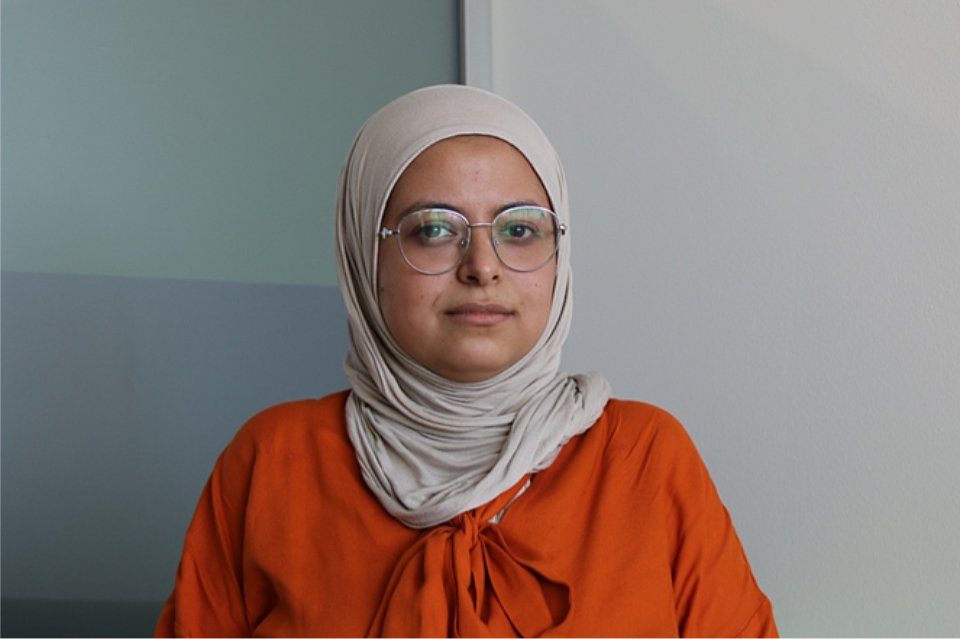Expert’s Take: “It was the longest minute of my life”
Date:

Conflict forced Lama Aljaradi to relocate from northeastern Syria to Gaziantep, Türkiye nine years ago. There, the leadership expert continued working for international and non-governmental organizations, including the United Nations Office for the Coordination of Humanitarian Affairs. She has worked for UN Women since 2022, supporting humanitarian operations in Syria and delivering training on gender in humanitarian action. Together with her 18-month-old child, she survived the earthquakes that hit Türkiye and Syria on 6 February and now shares her experience and expert insights.
How did you experience the earthquakes on 6 February 2023?
That night, my child was crying, and I’d been trying to get him back to sleep for hours. I finally managed after 4 a.m. Then, the house started shaking and I could hear things smashing and breaking. I grabbed my child and hid under the dining table. He was crying inconsolably and all I could think about was how I could protect him if the building collapsed. It was the longest minute of my life.
After the earthquake ended, I grabbed my phone and his jacket and ran downstairs. It was freezing cold outside. I was trembling and my Turkish neighbours invited me to squeeze into their car with them. Only then did I realize I’d left without a jacket or headscarf. We were eight people in the car, some even squeezing into the trunk. We felt many aftershocks. I waited in the car until noon, then decided to return home because my child was hungry and sleepy. I’d just packed a bag with essential goods when a the second earthquake started – much stronger than the original. I ducked back under the table with my baby, closed my eyes and prayed. I felt it was the end. But I was lucky and blessed that we managed to escape.
What are the main needs of women and girls during such emergencies?
Reflecting on my personal experiences and the experiences of those around me, we need safety first. Reception centres and temporary shelters need to be equipped with safe and separate wash facilities for women that are properly lit and secured with locks. It is also important for us to know what is going on around us, to make informed decisions, so access to technology plays a key role. Especially in northwestern Syria, not all women and girls have access to devices and the Internet and they may rely on others for information that is not always reliable.
Like me, many women left home or were extracted from collapsed buildings without proper clothing or headscarves. Psychosocial support is another important need – both individual sessions and group psychosocial support. Sharing one’s experiences and having a sense of solidarity and belonging helps with post-traumatic recovery.
How might the earthquakes specifically impact women and girls?
There is a risk that progress made by women, in terms of participation and equal representation, may be undermined. Women may be excluded from decision-making, relief and rescue efforts and even from the rebuilding phase – the excuse [and expectation] being that they need to focus on their families. But what women need most now is a voice and a venue to support each other and their communities.
In crises and natural disasters, the sense of despair and the change in gender dynamics also often lead to increased gender-based violence, in all its forms. The risk of sexual harassment and abuse is major now, especially in the absence of safe and dignified shelters and water, sanitation and hygiene facilities. Existing discriminatory practices against women might also be exacerbated by the crisis.
How is UN Women working to respond on the ground?
Although UN Women’s role is not to provide relief or set up tents for affected people, it has played a critical role from day 1 in analysing information gaps, in conducting assessments, meetings and consultations with affected women, and in advocating for a gender-sensitive humanitarian response. We are currently conducting a gender analysis to highlight the specific needs of women and girls and ensure that they are reflected in the response plan.
UN Women actively engages with humanitarian leadership and coordination to highlight information gaps and the needs of women, girls, boys and men, particularly those facing multiple forms of discrimination. I’m proud to be part of this work because I’ve heard repeatedly from women affected by the earthquake that they don’t feel their needs are being prioritized.
Why is it important to engage women in crisis response?
There is no question that men and women should have equal access to information, decision-making and resources. Men simply do not understand the specific needs of women in a crisis, and vice versa. Women must be equally engaged to properly assess their needs, design a better response and recover.
The solidarity and support women provide to others during crises is also priceless and shows how important it is that women are not positioned merely as recipients of aid but as active partners. UN Women has a great responsibility in this emergency to advance gender equality and to ensure that the humanitarian response is not only gender-sensitive but gender-transformative.